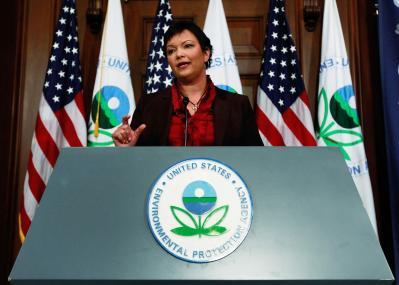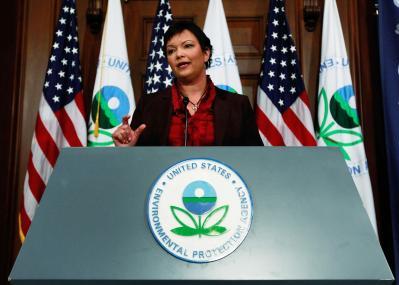 EPA Administrator Lisa Jackson is now star of the show.The less-than-glorious death of cap-and-trade means that any effort to control greenhouse gases at the federal level now rests solely with the EPA. Not surprisingly, the agency has become the favorite whipping boy of politicians stirring up job-loss paranoia.
EPA Administrator Lisa Jackson is now star of the show.The less-than-glorious death of cap-and-trade means that any effort to control greenhouse gases at the federal level now rests solely with the EPA. Not surprisingly, the agency has become the favorite whipping boy of politicians stirring up job-loss paranoia.
What’s two years? Sen. Jay Rockefeller, Democrat from Coal Central, aka West Virginia, is making noises about introducing an amendment to the Senate energy bill that would stop the EPA from dealing with greenhouse gases for two years. Sen. Lisa Murkowski (R-Alaska) attached a similar measure to small-business legislation. That bill is stalled now, but Murkowski’s not likely to go mellow on us. She told Politico’s Darren Samuelsohn, “You attack it at all fronts. You go the judicial route. You go the legislative route. I think this is important to make sure we are looking at all avenues.”
Take that snit outta here: For its part, the EPA came out swinging last week, rejecting challenges from 10 petitioners — including attorneys general from Virginia and Texas — to the agency’s position that greenhouse gases endanger public health and the environment. The challengers ranted about “Climategate” and how it raised serious questions about climate science. But as The Washington Post notes in an editorial today:
As with much climate-change skepticism, the petitions were based “on selectively edited, out-of-context data and a manufactured controversy,” EPA Administrator Lisa P. Jackson said. Among other things, the agency reviewed every document from the “Climategate” email hack at a respected British climate research unit. The EPA found what four other independent studies did: that the emails contained some “candid” language but nothing that seriously discredits the scientific consensus on global warming.
Or we can do it the hard way: The upshot is that, given the failure of the Senate to pass climate legislation, the effort to address the problem will fall into the byzantine world of regs and lawsuits. As Eric Pooley writes at Yale Environment 360:
Welcome to the “glorious mess” — Michigan Rep. John Dingell’s phrase for the tangle of regulation and litigation that will follow when Congress fails to act. We are about to experience precisely the sort of costly, protracted, plant-by-plant trench warfare the cap was intended to avoid. Since the utilities and the manufacturers weren’t willing to cut a deal, this is what they get. The fragile period of compromise and cooperation between environmentalists and big business may now be coming to an end. Green groups that have invested time and money into the legislative process are now putting on their war paint and returning to the courts, with a renewed focus on stopping new coal-fired power plants and shutting down the oldest and dirtiest ones.
Steven Cohen, executive director of Columbia University’s Earth Institute, goes so far as to suggest that utility companies will rue the day cap-and-trade withered away. He writes in The Huffington Post:
The price on carbon long sought by environmental activists and alternative energy entrepreneurs will be set indirectly by [EPA] regulations. Electric utilities will need to develop a method to sequester and store greenhouse gases. Unlike Waxman-Markey, there will be no offsets available for purchase to allow emissions to continue. There will be no cap-and-trade to allow old polluting factories to buy pollution allowances from newer, cleaner facilities. There will be compliance schedules, penalties, and injunctions. The same methods we employed to clean water, toxics, and other air pollutants will be trotted out to deal with the U.S. contribution to global warming. It will be the Environmental Lawyer Full Employment Act of 2010. To all you law students out there, sign up for climate law; it’s going to be a growth area for the next several decades.
That’s the way we coal: Ultimately, the EPA’s efforts to control pollutants other than greenhouse gases might lead to the shutdown of up to 20 percent of coal-fired power plants in the U.S. by 2015, as Bradford Plumer writes for The New Republic:
[C]oal-fired power plants don’t just emit heat-trapping gases that warm the planet. They also churn out mercury, which accumulates in fish and causes developmental problems in young children. They belch out sulfur dioxide, which creates acid rain. They send up nitrogen dioxide, which helps form ground-level ozone and leads to all sorts of respiratory and cardiovascular problems, sending tens of thousands to the hospital each year. They produce coal-ash waste that can poison surrounding areas, as happened in 2008, when a dike broke at a Tennessee Valley Authority plant, creating a sludge flood that will cost up to $825 million to clean up.
The EPA is currently trying to knuckle down on all of these nasty side effects.
Dirty dancing: Already-skittish members of Congress are pushing back hard against the EPA’s proposal to classify coal ash as a hazardous waste. And utility companies in the Eastern U.S. are gearing up to battle new “transport rules” proposed by the EPA last month that would require power plants in 31 states and the District of Columbia to cut emissions of sulfur dioxide and nitrogen oxides.
Let the flames begin.



